|
| This is the next chapter excerpted from my memoir of my experiences in the Army, including serving a year in Vietnam, a coup d’état in Cambodia that overthrew Norodom Sihanouk and a trip around the world coming home. This covers the period February and March of 1970, when I was discharged and headed west into Cambodia.
LAST DAY IN VIETNAM
It was March, 1970, when my taste for adventure probably exceeded my common sense. I was in Vietnam, about to complete my one-year tour of Army duty, and Phnom Penh, once known as the “Pearl of Asia,” was only an hour away by air from Saigon. I wanted to see Cambodia’s Angkor Wat, one of the architectural wonders of the world. I didn’t know if I would ever get back to southeast Asia, so I took a leap of faith.
On the day of my discharge, I chose to forego the coveted “freedom bird” flight back to “the world” and instead boarded an Air Vietnam flight to Phnom Penh, about the same distance as flying from San Francisco to Los Angeles. On March 7, I was a uniformed and armed U.S. Army officer in Vietnam; on March 8, after an hour’s flight, I was an unarmed civilian in a very strange but beautiful and intriguing country.
While Cambodia was once a part of the same French Indochina as Vietnam, it was another world even in 1970. Since the beginning of the war in Vietnam, American forces had been officially barred from entering Cambodia, although clandestine operations in both Cambodia and Laos had been going on for years. Substantial North Vietnamese and Viet Cong forces were operating from the eastern border regions of Cambodia and the Ho Chi Minh Trail, but the capital was untouched by war and retained that distinctive patina of decaying French colonialism. Little did I know that Nixon would announce the invasion of Cambodia six weeks later!
Following is a letter to my parents dated March 1, 1970: 1 March 1970
Dear Folks,
Well today ended officially my tour of duty with the 159th Engineer Group. We had a grand hail and farewell last night with four bird colonels and all the battalion commanders present – probably the best one since I’ve been here and the first time most of the wheels have seen our new club.
I could barely walk this morning but made it to the morning briefing and shakily accepted a Bronze Star and Army Commendation Medal. As far as I know, I’m the first junior officer in the group headquarters to receive both commendations – and it rather surprised me!
I have only to wait until 7 March to get my discharge and then another two days to catch the plane to Phnom Penh, Cambodia. I’m staying in Saigon – It’s really like an R&R or something. The weather has been real nice – cool and breezy – but sunny – so I’ve been lying around the pool in the hot part of the day and touring around in the late afternoon and evenings. I was trying to get a flight to Cam Ranh today to see Doug Cummings before he left, but the flight was running several hours late, and I was afraid I might miss him, so I called the whole thing off.
My travel fever has been considerably excited of late due to the arrival a few days ago of two guys who were friends of a friend of mine at 20th Engineer Brigade. These two characters were ex-Peace Corps types who have spent the last year traveling and came in here from India, Nepal, Thailand, Cambodia, etc. They’ve been staying with me in Saigon and have fed me wealths of information on points west of here. I’m not thoroughly convinced – but am considering going from Japan either back through the Indian sub-continent and Middle East, or through Russia via the Trans-Siberian Railway (only $230 from Hong Kong to London). And … eventually catching my free ride home from Europe rather than Japan. At any rate, I’ll keep in touch as my tour plans solidify.
One thing that will affect them (my plans) is the status of my acceptance from Berkeley. If I do go there this fall, I’m going to have to get back in the groove and save a little money (or avoid spending what I’ve already saved). One place that you can count on as a forwarding address is c/o Bernhard Horstmann, which is in turn c/o Mrs. Bri Johnston, The Gallery, Imperial Hotel, Tokyo, Japan. I should be in Tokyo sometime early in April. I promise to contact, if not sponge off of, those people that Murt and Haha fixed me up with. Mary Huntington has also given me number of contacts in Laos and Bangkok – and some other tips and information. I’m embarking on this trip immeasurably more organized and informed than on my trip to Europe two years ago.
If I do go on to Europe, I intend to hook up with Sharon Blair and Pat Rowan, who are still living in Vienna. I just got a letter from Sharon saying they are both staying indefinitely. I’ll probably have to check out the situation there.
Not much else to report for now, but I’ll keep you posted.
Love, Tom
PS. I’ll continue to pick up my mail at the 159th until I leave the country.
 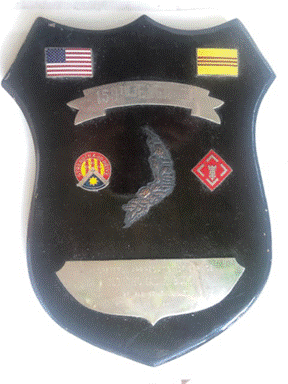
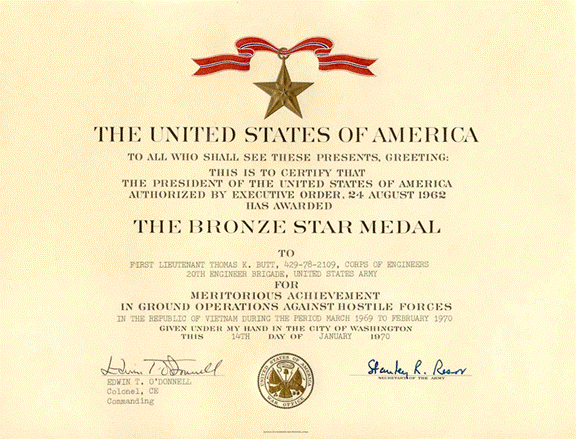
Figure 2 - "Citation, by direction of the president, the Bronze Star Medal is presented to First Lieutenant Thomas K. Butt, Corps of Engineers, United States Army, who distinguished himself by outstanding meritorious service in connection with military operations against a hostile force in the Republic of Vietnam. During the period March 1969 to February 1970, he consistently manifested professionalism and initiative in obtaining outstanding results. His rapid assessment and solutions of numerous problems inherent in a combat environment greatly enhanced the allied effectiveness gains a determined and aggressive enemy. Despite may adversities, he invariably performed his duties in a resolute and efficient manner. Energetically applying his sound judgment and extensive knowledge. He has contributed materially t the successful accomplishment of the United States mission in the Republic of Vietnam. His loyalty, diligence and devotion to duty were in keeping with the highest traditions of the military service and reflect great credit upon himself and the United States Army.”
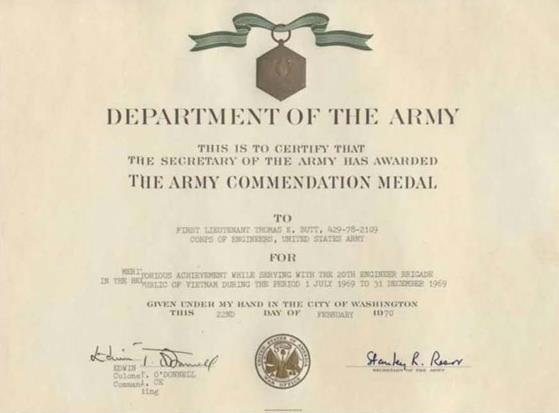
Figure 3 – “By direction of the Secretary of the Army, under the provisions of 672.5.1, the Army Commendation Medal for Achievement is awarded to First Lieutenant Thomas K. Butt, Corps of Engineers, United States Army, for meritorious achievement, in connection with military operations against a hostile force in the Republic of Vietnam. During the period 1 July 1969 to 31 December 1969, he distinguished himself by meritorious achievement while serving with the 20th Engineer Brigade, Republic of Vietnam. Through dil0gence and determination, he accomplished his assigned mission wit dispatch and efficiency. His unrelenting loyalty, initiative and perseverance brought him wide acclaim and inspired others to strive to maximum achievement. Selflessly working long and arduous hours, he has contributed significantly to the success of the allied effort. First Lieutenant Thomas K. Butt’s commendable performance, outstanding achievements and devotion to duty were in keeping with the highest traditions of the military service and reflect great credit upon himself, his unit, and the United States Army.”
 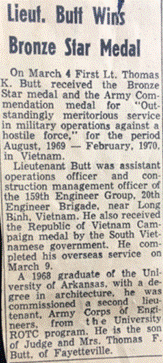
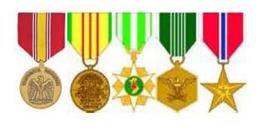
Figure 5 - National Defense Service Medal, Vietnam Campaign Medal, RVN Campaign Medal, Army Commendation Medal and Bronze Star
The day before I departed for Cambodia was not without drama. Several weeks before, I had lent $700 to Bernhard Horstmann, a friend with whom I shared the Saigon Apartment. Bernhard had been discharged several weeks earlier and had stopped off to see his mother in Hong Kong and his sister in Tokyo before going back to New York. Bernhard’s mother lived in Hong Kong and was a well-known and highly successful businesswoman in the antique and Chinese reproduction furniture trade. For some reason, which never became entirely clear, Bernhard had left the $700 loan repayment with an employee of his mother with instructions to mail it to me in Vietnam.
The normal way of addressing mail to a U.S. service person is through an APO (Army Post Office), in this case, with a San Francisco zip code. For some reason, the employee addressed the package to me with simply my unit number in “Long Binh, South Vietnam.” To make it even more mysterious, he distributed seven $100 bills in the pages of a paperback book, and included a piece of paper with the page numbers.
Instead of getting into the U.S. controlled military mail system, the parcel went via international mail to the main Saigon Post Office. I received a post card in the mail informing me I had delivery at the Saigon Post Office. I went down to pick it up, and a Vietnamese postal employee said, “Do you wish to accept this?”
I replied, “Sure,” and I signed for it as instructed. Then he said, “I am a Vietnamese Customs Officer, and you have violated the Vietnam law on currency importation by accepting foreign currency outside legal channels.”
“Great,” I said, “What happens now?”
“Well, you are under arrest, and if you don’t cooperate, we will send you to prison” If you cooperate and confess, we will assess a fine.”
“How much will the fine be,” I asked.
“How much do you have on you,” he replied. I emptied my pockets of about $500 in MPC (Military Payment Certificates), which I had recently withdrawn from the bank in preparation for my trip the next day to Cambodia.
He allowed as how that might be about right, but he also wanted to know my military status and where I was staying. I explained that I had been formally discharged the previous day and that I was staying at an apartment in Saigon. He then decided that they would like to visit the apartment and contacted both the MP’s (U.S. Military Police) and the Con Sat (Vietnamese Military Police). A convoy of jeeps with Customs, Con Sats and MP’s pulled up at the apartment, and we all went inside. As we opened the door, about a dozen decked out Vietnamese women shouted “Surprise!” They were friends, all set up for going away party.
The officials told the women to get lost and proceeded to search the apartment. They were intrigued by the phony ID’s I had accumulated and thought that was suspicious enough to warrant a more detailed search. Searching a high shelf in a closet, they exclaimed “Ah ha,” when they discovered a large black plastic bag containing about a bushel of marijuana. It was left over from one or more of my departed roommates; I was not a user of marijuana. With that discovery, they offered the American MP’s an opportunity to take some action, but after confirming that I was no longer a member of the armed forces, the MP’s shrugged and left.
Marijuana was not a big deal in Vietnam, and as far as I know, was not illegal for Vietnamese. My recollection is that it was for sale in public markets. Anyway, we all went back down to the Customshouse. Mr. Thuy told me that I would need to dictate a confession to a Vietnamese typist. Unfortunately, the typist could neither speak English nor type very well. So I typed the “confession” for him because the hour was getting late. While all this was going on, Mr. Thuy sent out for sandwich for me and invited me to take my pick of a beverage from one of several pallets of soft drinks confiscated from who knows where.
Then Mr. Thuy said, “We are through for today. Come back tomorrow, and you can pay your fine.” Mr. Thuy did, however, keep my U.S. passport.
That was a defining moment for me. So far, this looked like just a way to extract $500 from me, but I was concerned that it could be much more serious. I had two choices. I could go directly out to Bien Hoa and catch the next plane to the United States, which my discharge orders allowed (I didn’t need a passport), and leave all the uncertainty behind as well as being $500 richer. Or I could play out the routine with Mr. Thuy and follow through with my plans to visit Cambodia as the beginning of an Asian odyssey.
Fortunately, my instincts were right. I went back to the Customs House, paid my fine, took a taxi to Tan Son Nhut and caught the next plane to Phnom Penh, Cambodia. I was happy but almost broke.
 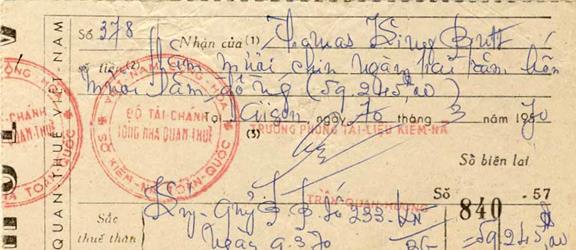
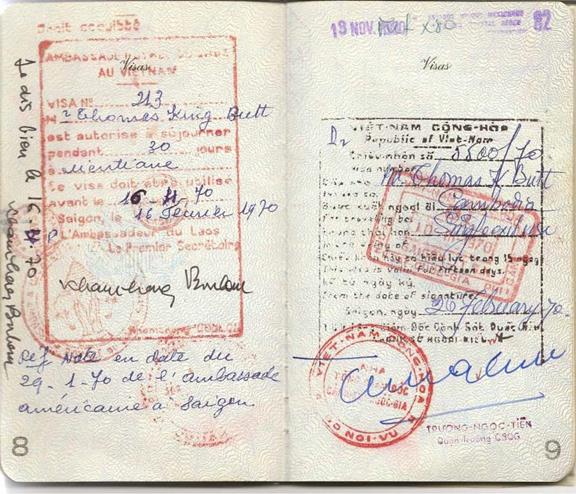
 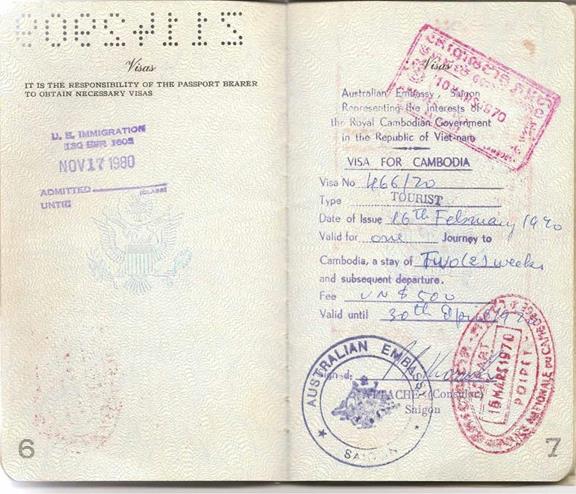
CAMBODIA
Phnom Penh is 229 km from Saigon (Ho Chi Minh City) by road (although none existed in 1970), and a 50-minute flight. In Phnom Penh, I checked into the Hotel Le Royal, an old French colonial structure built in 1929. It was elegant but was cheap and very worn. There were mostly international journalists hanging out there; it had kind of a Graham Greene mystique about it. I remember taking a swim in the pool, which was an opaque green color but felt good.
When Shirley and I returned in 2009, we stayed in the same Hotel Le Royal, as best I could tell, in the same room I had in 1970.
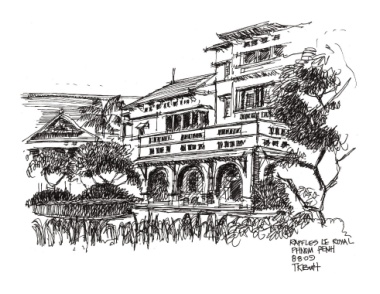
Figure 8 - 2009 sketch of Le Royal Hotel in Phnom Penh
I never saw an American in Cambodia; the foreign visitors I ran into were mostly either French or Japanese. Few, if any, people spoke English, but my remnant high school and college French served me well (Thank you Mrs. Andrews!) as well as a little Vietnamese. I spent a few days touring Phnom Penh by foot and cyclo. It was very quiet, very clean and very French with an Asian overlay. I was so broke, I could not afford film for either my cameral or my movie camera, so I took no photos and made no films.
Just as I was getting ready to leave for Siem Reap (Angkhor Wat) there was a coup in which Prince Sihanouk was overthrown. At that time, Sihanouk was head of state and had been trying to keep Cambodia out of war for a decade. Wikipedia describes the situation as follows:
When the Vietnam War raged, Sihanouk promoted policies that he claimed to preserve Cambodia's neutrality and most importantly security. While he in many cases sided with his neighbors, pressures upon his government from all sides in the conflict were immense, and his overriding concern was to prevent Cambodia from being drawn into a wider regional war. In so doing he made difficult choices of alliances in pursuit of the least dangerous course of action, within a political environment where genuine neutrality was likely impossible at the time. In the spring of 1965, he made a pact with the People's Republic of China and North Vietnam to allow the presence of permanent North Vietnamese bases in eastern Cambodia and to allow military supplies from China to reach Vietnam by Cambodian ports. Cambodia and Cambodian individuals were compensated by Chinese purchases of the Cambodian rice crop by China at inflated prices. He also at this time made many speeches calling the triumph of Communism in Southeast Asia inevitable and suggesting Maoist ideas were worthy of emulation. In 1966 and 1967, Sihanouk unleashed a wave of political repression that drove many on the left out of mainstream politics. His policy of friendship with China collapsed due to the extreme attitudes in China at the peak of the Cultural Revolution. The combination of political repression and problems with China made his balancing act impossible to sustain. He had alienated the left, allowed the North Vietnamese to establish bases within Cambodia and staked everything on China's good will. On 11 March 1967, a revolt in Battambang Province led to the Cambodian Civil War.
On March 12, 1970, I awoke to the sounds of sporadic gunfire and a hundred thousand people jamming the streets of Phnom Penh. It turned out that Sihanouk was out of the country on a tour of Europe, the Soviet Union and China. It was a coup d’état. See Cambodian Coup of 1970. The North Vietnamese Embassy was sacked and burned.
U.S. leaders were clearly frustrated with Sihanouk’s collaboration with North Vietnam and the Viet Cong, as was Prime Minister Lon Nol, but CIA involvement in the coup plot remains unproven. The next day, March 13, I headed north to the town of Siem Reap to spend a week at Angkor Wat.
SIHANOUK REPORTED OUT IN A COUP BY HIS PREMIER; CAMBODIA AIRPORTS SHUT
By Henry Kamm Special to The New York Times
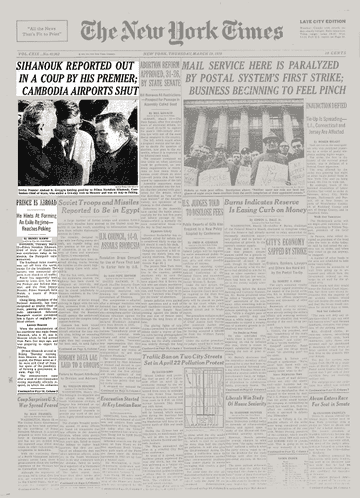
Credit...The New York Times Archives
BANGKOK, Thailand, March 18—Prince Norodom Sihanouk, Chief of State of Cambodia, was overthrown today in his absence, the Pnom penh radio announced.
The Southeast Asian country was cut off from the world, except for the broadcasts. The nation's two commercial air ports were closed to all traffic.
Power has apparently been seized by Lieut. Gen. Lon Nol, the Premier and Defense Minister, and the First Deputy Premier, Prince Sisowath Sirik Matak, a cousin of Prince Sihanouk.
Cheng Heng, President of the National Assembly, has been designated as interim Chief of State, pending elections, the radio announced. Informed Pnom penh sources considered him a figure of negligible political stature.
Leaves Moscow
When the announcement of his overthrow was made Prince Sihanouk, who is 47, was in Moscow where he had arrived from Paris five days ago, and was preparing to depart for Peking.
[Prince Sihanouk arrived in Peking Thursday morning from Moscow. In the Soviet capital, the Prince acted as if he were still Chief of State but spoke of the possibility of forming a government in exile. Page 16.]
The announcement came after a week of anti‐Communist rioting, reportedly officially in spired, in which the embassies of North Vietnam and the Viet Cong were sacked. These events moved Cambodia close to open hostility with the Vietnamese Communists, who are operating in large number on the Cambodian side of the long frontier with South Vietnam.
Last Friday, the Cambodian Government asked North Vietnamese and Vietcong troops to leave the country by dawn Sun day. Meetings on the demand have been held subsequently in Phnom Penh, but no progress has been reported. [Reuters report ed that, following the coup, the National Assembly had adjourned after failing to agree on measures to rid the country of Communist forces.]
Prince Sihanouk, a neutralist whose policies swerved often between right and left in an, effort to strike a balance, is known to have struggled for a year against the hard anti Communist position of General Lon Nol and Prince Sirik Matak.
According to informed sources, that struggle precipitated Prince Sihanouk's down fall, but was not its principal cause.
What brought him down, the sources said, was his cult of personality, his expensive striving for grandeur, the stagnation of Cambodia's economy, the corruption of leading pesonalities and the bureaucracy and widespread smuggling and trading in contraband goods.
No reports of violence attendant on today's events have reached the outside world.
The broadcasts are being received here imperfectly, on powerful monitoring equipment. Cable and telephone connections are not functioning.
Cambodia's two commercial airports, Phnom Penh and Siem Reap, were closed shortly after noon today without prior warning. The war in South Vietnam and Laos, and political strains with Cambodia's other neighbor, Thailand, have effectively cut off access to Cambodia by road.
Neighboring countries learned of the events in Phnom Penh from a French‐language broadcast that said:
“Following the political crisis provoked by Prince Norodom Sihanouk in the past days, the National Assembly and the Royal Council in joint session, in accordance with the constitution of the Kingdom, unanimously withdrew their confidence from Prince Norodom Sihanouk. From this day, 18 March 1970 at 1300 hours [1 A. M. Wednesday, New York time], Prince Norodom Sihanouk ceases to be the Chief of State of Cambodia and will be re placed by. Cheng Heng, the President of the. National Assembly, who will assume the function of the Chief of State until the election of a new Chief of State in accordance with the text of the nation's Constitution”
Prince Sihanouk had left Phnom Penh on Jan. 6 for the announced purpose of taking a cure in Grasse, France, for obesity and a blood disorder. He set out on the return journey, with scheduled stops in Moscow and Peking, after the rioting broke out.
The first indication of events more serious than the rioting and the challenge last Friday by Cambodia to the Vietnamese Communists to withdraw their troops came today with the sudden closing of Phnom Penh Airport.
Plane Turns Back
A Union of Burma Airways commercial flight left here for Phnom Penh at 11:30 A.M. after receiving clearance for the 50‐ minute flight from the Saigon Control Tower, which directs traffic for the Cambodian capital. On board, the stewardess could be heard to announce that the landing was imminent. But then the pilot's voice came over the public‐address system to announce that Phnom Penh Airport was closed and he was turning the jet back toward Bangkok.
No reason was given, the pilot said. The mystery persisted until shortly before 3 P.M. The Phnom Penh station then came on the air to announce that a Cambodian Government communique was being read to a special session of the National Assembly.
In the statement, the Government accused the Vietnamese Communists of spreading false rumors, bribing Cambodian officials and distributing anti Government leaflets, all in an effort to set Cambodians against Cambodians.
In view of this, and for reasons that were not stated, the Government announced that it was relieving the Phnom Penh police chief of his functions and would take “extreme measures” to restore calm.
Although the Phnom Penh radio usually goes off the air at 3 o'clock, it stayed on after the announcement, broadcasting light music.
At 5:07 P.M., the music was interrupted for the communiqué containing the decisive announcement of Prince Sihanouk's overthrow.
Prince Sihanouk abdicated the throne of Cambodia in 1955, because, he said, the monarch was the prisoner of a rigid system and could not serve his people as effectively as he wished. He became Chief of State.
Throne Is Vacant
His father, King Norodom Suramarit, succeeded him. Since his death in 1960, his widow, Prince Sihanouk's mother, Queen Kossamak Nearireath, has represented the monarchy while the throne remains vacant.
Mr. Cheng Heng went on the air after Prince Sihanouk's ouster was announced to declare his acceptance of the title of Acting Chief of State.
He was elected President of the National Assembly in 1968 and re‐elected last year. He is a wealthy lawyer and former Agriculture Minister.
In the view of the sources recently in Phnom Penh Prince Sihanouk in his last year as Chief of State had shown a pronounced shift to the right toward the position of his political adversaries. He had become increasingly harder in his pronouncements against the Communists and had noticeably diminished his tendency to balance anti‐Communist statements with strident attacks on “American imperialism.”
Military Discontented
Nevertheless, the increasing pressure of the North Vietnamese and Vietcong largely because of their increasing need to find sanctuary in territory safer from American firepower than South Vietnam, heightened the political struggle in Cambodia by causing discontent with Prince Sihanouk's policies within the military, the sources said.
The soldiers were described as exasperated by apparent differences in the Chief of State's words and his actions. They charged that though the Prince condemned the Vietnamese Communists as the enemy in speeches, he forced the Cambodian military to release all Vietcong they captured.
They saw a contradiction between his complaints that the Vietcong were obtaining much of their food through illegal purchases from Cambodian farmers and his recognition last year of the Vietcong's so‐called provisional revolutionary government and his subsequent signing of a trade agreement with it.
The military were said to resent what they considered Prince Sihanouk's ambiguous policy of ordering the armed forces to intervene against American attacks on Vietnamese Communist military targets on Cambodian soil. Cambodian gunfire was reported to have brought down an American fighter ‐ bomber attacking a Vietnamese anti‐aircraft position in Cambodia last November. The result was a heavy
American attack on the Cambodian installation that killed 27 Cambodians.
These sentiments were said to have contributed to turning General Lon Nol from a loyal follower of the Prince into a determined opponent. The general's control of the small military forces—about 35,000 in a nation of 7 million—is said to be complete.
Investments Assailed
Prince Sirik Matak's opposition was said to have been rooted more in his dis approval of what he considered his cousin's flamboyant megalomania, Prince Sihanouk's insistence on nationalization of Cambodia's few industries, wastefulness in the use of limited investment capital and tolerance of widespread corruption.
Prince Sirik Matak, according to the sources, was leader of a body of opinion that believed that Prince Sihanouk was condemning Cambodia to economic disaster by ill‐planned investments. Among these were his plan to build a port city named after himself — Sihanoukville in which less than one ship a day docked in 1969, as well as plants for the manufacture of tires, jute sacks, textiles and distilleries that produced no revenues for the state but were said to enrich those whom Prince Sihanouk named as di rectors.
Other investments cited were large hotels in places that do not need them; state‐run night clubs with taxi‐dancers, and two movie houses, one for the international film festivals in which the Prince's own productions have on both occasions won the first prize, and one for the showing of the Prince's films to the public.
Prince Sirik Matak and General Lon Nol were reported to have agreed by last summer that the only way to return Cambodia to order was to limit the Chief of State's exercise of power. The issue was at the, center of the 27th Congress last June of the Sangkum, the political movement founded by Prince Sihanouk to group all political factions under one organization, with himself on top.
When, subsequently, Premier Pen Nouth stepped clown because of long illness and General Lon Nol was asked by the Chief of State to form a cabinet, the general replied that he would form a government only as Premier and not as merely a secretary to Prince Sihanouk.
A special congress was named by Prince Sihanouk and in structed to form a government. General Lon Nol, the over whelming choice, rejected the office at first and accepted only after the Chief of State met his conditions.
They were, principally, that he would have the right to choose his ministers and that they would report to him, not to Prince Sihanouk.
Almost A Coup
The Chief of State accepted and the Cabinet took office last Aug. 12. This acceptance by Prince Sihanouk of a government with powers not dependent on his whims was consiered by some observers a bloodless coup. The Premier and Prince Sirik Matak issued decrees in the early days of their government to solidify this “coup.”
The Premier ordered all Government communications and letters to be addressed to the Premier's office rather than to the Chief of State. The Deputy Premier, who made the country's economy his special field, ended the practice of having certain taxes, such as those on motorcycles and scooters, paid into the Chief of State's treasury rather than the Government's.
During the 28th Congress of the Sangkum, in the last days of last year, Prince Sirik Matak weakened the Chief of State's position by forcing the closing of the Phnom Penh Casino over Prince Sihanouk's opposition. A few days later, Prince Sihanouk, reportedly under heavy pressure, left for France, with Prince Sirik Matak, in all but in name, in charge of Cambodia.
Action Against Communists
Last month, General Lon Nol, who had been in France, re turned, and open measures against the Vietnamese Communists in Cambodia followed.
The sources said that one of the most significant anti‐Communist moves was cooperation between the South Vietnamese and Cambodian armed forces in fighting the Vietcong in the border areas. This is effected, according to the sources, by Cambodian officers' intention ally discussing on “insecure” telephone lines known to be overheard by the South Vietnamese the disposition of enemy troops.
The sacking of the North Vietnamese and Vietcong embassies in Phnom Penh last Wednesday followed, and, in the view of the sources, Prince Sihanouk's ouster was the goal that the Prince's opponents had pursued since last summer.
In Paris the day after the embassies were sacked. Prince Sihanouk said that be believed a coup against him was a possibility, and that General Lon Nol might lead it.
Letter to my parents on March 16, 1970: 16 March 1970
Dear Folks,
I have for three days now been in Siem Reap, which is the town near the temple complexes of Ankhor Wat. For reasons that I will relate when I have more time and paper, I left Vietnam with substantially less money than I had anticipated, so I am not exactly traveling in the grand style – but at the same time enjoying it more.
My first leg out of Saigon took me to Phnom Penh, the capital of Cambodia, which was only 20 minutes by air. It could as well be half way around the world by appearance. I was at once impressed by the cleanliness and friendliness of the city and amazed at what a different attitude the Cambodians seem to have about taking care of their environment. The Vietnamese hold the Cambodians almost in contempt and consider them to be culturally inferior – but quite the opposite is true. Phnom Penh is a real pleasure. There are broad boulevards and many parks – and all very quiet with little motor traffic, congestion and smog. Every street is completely lined with trees and flowers, and on every corner is a sidewalk café in the best European tradition. The people are a mixture of Khmer (true Cambodian), Vietnamese and Chinese – and most speak varying amounts of French. English is not too common except around the hotels – and for the first time in ages my old French is really getting a workout and doing quite well.
The only westerners I saw in Phnom Penh were all French – and there were a good many Japanese. After a couple of relaxing days, I took a taxi (station wagon with 16 people in it) to Siem Reap and I am now staying on the roof of a Chinese hotel. This roof is known far and wide as “the place’ for budget travelers in Cambodia. You get a cot, one sheet and one thin blanket for $1.00 a night. It’s really quite nice. Most of the patrons are ex-Peace Corps types from all over the world. You can feed yourself for less than $1.00 a day at the local market on tasty tidbits of dubious quality and cleanliness. The temples near here date from the 10th to the 12th Century and are one of the most impressive things I have ever seen. Reclaimed from the jungle starting over 60 years ago, most have been partially rebuilt in painstaking detail. They are huge beyond belief – and the walls, gateways and artificial lakes spread out through the jungles for miles in every direction. The main roads are laid out so as to form a series of loops by which you can se each of the major complexes in series. This is the place that is famous for temple rubbings – and I have purchased a number that I am ending home from Thailand in a day or two. I paid less than a dollar apiece for them. Hey are probably worth much more in the states.
Tomorrow, I am going to Thailand by bus, taxi and train via the overland route between here and Bangkok. After a few days in Thailand, I’ll probably fly to Hong Kong and Japan where I really have to make a big decision. For only a little over $200, I can take the railroad across Russia in a trip that includes food, lodging, etc. I think this would really be fantastic! I would have to stay in Japan for maybe up to a month to get my visa and all plans worked out with Intourist. But the trip across is only 10 days from Vladivostok to Moscow. I could then catch my free ride back to the states from Germany, Spain or England, according to how things work out. I’ve got another big temptation to take a trip down the Malaysian peninsula through Indonesia and visit Bali, which is the really “in” place in Asia and also very cheap. But I don’t think I’ll do it at the expense of my Russia trip.
Anyway, I‘m thoroughly enjoying myself and enjoying being a civilian once again. I’m eager to come home, but there is so much to see in this part of the world. I don’t see how I can afford to miss it. Will keep you informed as I move around.
Love, Tom
 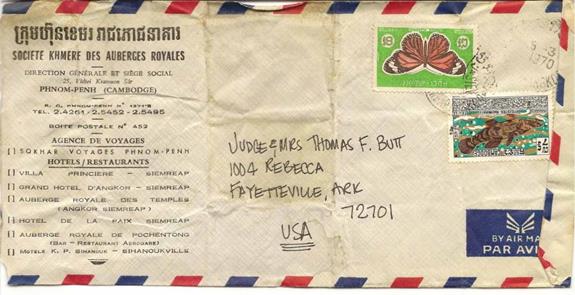
 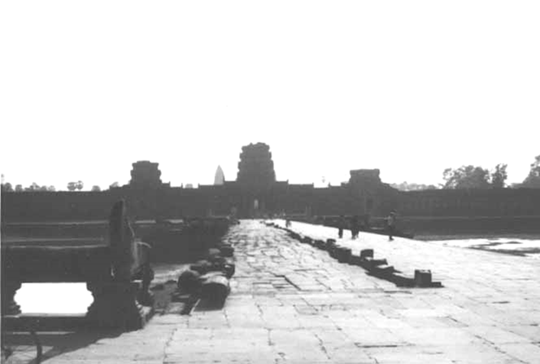
 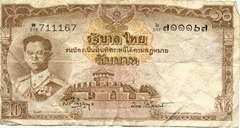
 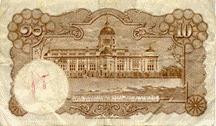
    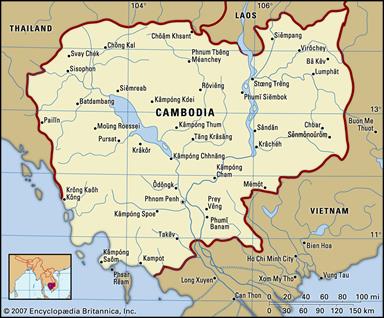
 
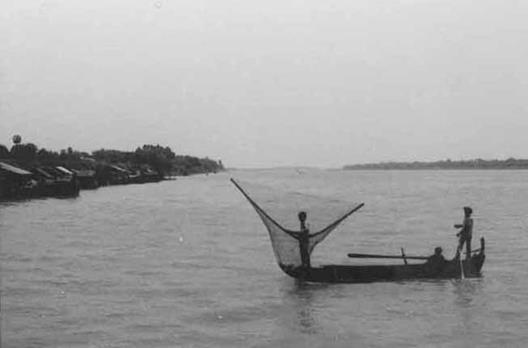
 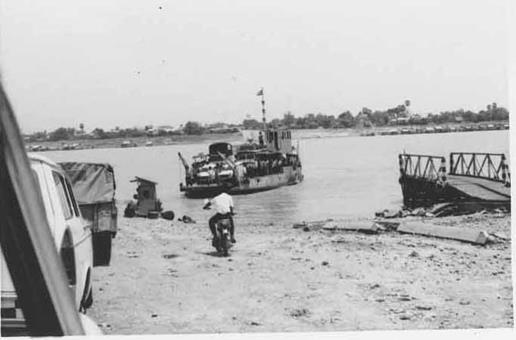
After I almost ran out of money in Siem Reap, I had to get to Thailand to find a bank. Because the airports were still closed following the coup, heading west to Thailand via land was our only option. Again, with a small group of westerners, we rented a station wagon and a driver and headed west. At some point, the roads became too bad and too narrow for the car, so we engaged a driver of a motorcycle with a trailer to continue the trip. Finally, as we neared the Thai border, we had to get out and walk across a bridge over a small river where we passed into Thailand at a decrepit border station in Poipet. I’ll bet the population of Poipet was less than 100 in 1970. Today, it is nearly 100,000.
At the small Thai border village, we boarded a steam train with wooden cars pulled by a wood burning locomotive. Within a few hours we had traveled from the heart of the jungle to downtown Bangkok.
 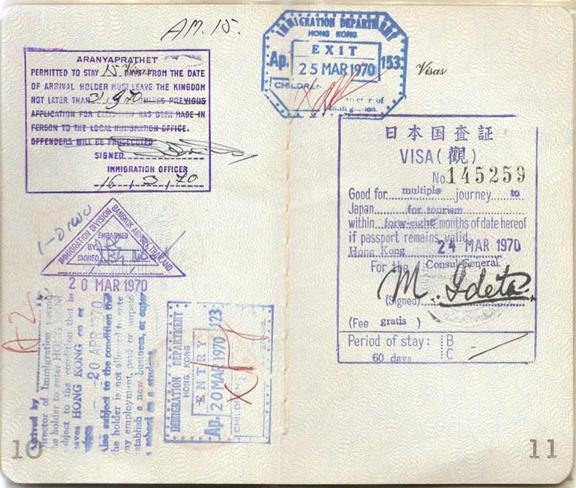
Next chapter coming in April – Thailand, Hong Kong and Japan. |

